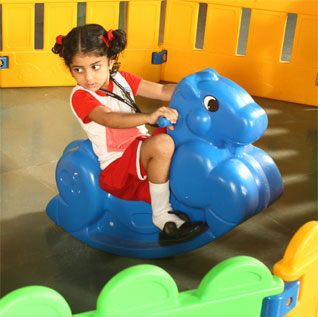A learning-disabled child needs special help with academics. Here are a few ways to help him better understand his studies. Anjum dreaded the phone calls from her six-year-old sons school. Every week, she would receive at least two phone calls, informing her of her sons latest misdemeanour. The fact that her son was diagnosed as having a learning disability did not help. Due to the large number of students in the class, her son was unable to get the personalised attention he desperately needed. Midway through the academic year, Anjum was told that if her sons performance did not improve, he would be asked to leave the school. Hearing this warning, Anjum frantically searched for a way to help her son. A child with a learning disability like dyslexia, attention deficit disorder (ADD), or attention deficit hyperactivity disorder (ADHD) is not unintelligent. However, he requires special attention and techniques to help him overcome his disability, when it comes to academics. Ideally, a learning-disabled child should have a qualified, personal tutor to help him. If this is not possible, it is the parent who will have to step into this role. Here are a few guidelines. In this articleHold His AttentionBreak Up His Work into Smaller PartsCreate a Pattern Hold His Attention A learning-disabled child often has problems with concentrating on his work. If he is unable to follow what is going on, he will lose interest in his work and his attention will wander. This makes him appear unmotivated and unwilling to learn. Your primary goal should be to keep your child focussed. The first thing is to clear the room of distracting influences. Set aside a dedicated study area for your child. Avoid having the study area near a window or he will be tempted to look for distractions outside. Keep only the material that your child requires, such as stationary and the relevant books. If the television is placed in the same room, see that it is switched off. When you are trying to explain something to your child, make eye contact with him. Whenever possible, use actions and expressions to further reinforce what you are saying. If you need to write something down, use large, bold letters that are written in different colours. With the advent of the digital age, PowerPoint presentations are another handy teaching aid. Try to make a few presentations related to your childs coursework. Even simple presentations will help him relate to what he is studying. Break Up His Work into Smaller Parts Research has proved that a child with a learning disability tends to have poorly developed memorising skills. This makes it difficult for him to recall whatever is being taught in school. As a result, he is likely to have difficulty in planning his assignments and managing his time. He may even forget to do his homework. Improving your childs memory will not happen overnight. However, your child will be more inclined to remember his studies if his work is organised and he is not burdened with too many topics at one time. Go through your childs study topic and break it up into smaller chunks. Give each chunk its own separate heading and put them into the required order for your child to study. Create a Pattern A learning-disabled child requires his work to have some sort of structure. This helps him know exactly how many tasks he has to complete. If he is used to following an established pattern of study, it will be easier for him to complete his assignments as time goes by. Creating a pattern of study for your child is not a difficult task. Begin every study session by summarising what has been done earlier on the same topic. Be clear with your words. By saying this is a summary or I recap, you are clearly stating which part of the pattern you are following. After summarising the earlier work, create an outline of the topic to be studied. Impress upon the number of points to be covered or tasks to be done. With each topic, repeat the main points as often as possible. Constant repetition is essential for your child in order for him to comprehend what he is studying and be able to remember it later on. Helping a learning-disabled child to keep up with his schoolmates is a challenging task. However, it not impossible to accomplish. All you need is a lot of patience and to give your child the love and respect he deserves. After all, he too is putting in his best efforts.
A learning-disabled child needs special help with academics. Here are a few ways to help him better understand his studies. Anjum dreaded the phone calls from her six-year-old son's school. Every week, she would receive at least two phone calls, informing her of her son's latest misdemeanour. The fact that her son was diagnosed as having a
learning disability did not help. Due to the large number of students in the class, her son was unable to get the personalised attention he desperately needed. Midway through the academic year, Anjum was told that if her son's performance did not improve, he would be asked to leave the school. Hearing this warning, Anjum frantically searched for a way to help her son.
A child with a learning disability like
dyslexia,
attention deficit disorder (ADD), or
attention deficit hyperactivity disorder (ADHD) is not unintelligent. However, he requires special attention and techniques to help him overcome his disability, when it comes to academics. Ideally, a learning-disabled child should have a qualified, personal tutor to help him. If this is not possible, it is the parent who will have to step into this role. Here are a few guidelines.
Hold His Attention
A learning-disabled child often has problems with concentrating on his work. If he is unable to follow what is going on, he will lose interest in his work and his attention will wander. This makes him appear unmotivated and unwilling to learn. Your primary goal should be to keep your child focussed.
The first thing is to clear the room of distracting influences. Set aside a dedicated study area for your child. Avoid having the study area near a window or he will be tempted to look for distractions outside. Keep only the material that your child requires, such as stationary and the relevant books. If the
television is placed in the same room, see that it is switched off.
When you are trying to explain something to your child, make eye contact with him. Whenever possible, use actions and expressions to further reinforce what you are saying. If you need to write something down, use large, bold letters that are written in different colours. With the advent of the digital age, PowerPoint presentations are another handy teaching aid. Try to make a few presentations related to your child's coursework. Even simple presentations will help him relate to what he is studying.
Break Up His Work into Smaller Parts
Research has proved that a child with a learning disability tends to have poorly developed memorising skills. This makes it difficult for him to recall whatever is being taught in school. As a result, he is likely to have difficulty in planning his assignments and managing his time. He may even forget to do his homework.
Improving your child's memory will not happen overnight. However, your child will be more inclined to remember his studies if his work is organised and he is not burdened with too many topics at one time. Go through your child's study topic and break it up into smaller chunks. Give each chunk its own separate heading and put them into the required order for your child to study.
Create a Pattern
A learning-disabled child requires his work to have some sort of structure. This helps him know exactly how many tasks he has to complete. If he is used to following an established pattern of study, it will be easier for him to complete his assignments as time goes by.
Creating a
pattern of study for your child is not a difficult task. Begin every study session by summarising what has been done earlier on the same topic. Be clear with your words. By saying 'this is a summary' or 'I recap', you are clearly stating which part of the pattern you are following.
After summarising the earlier work, create an outline of the topic to be studied. Impress upon the number of points to be covered or tasks to be done. With each topic, repeat the main points as often as possible. Constant repetition is essential for your child in order for him to comprehend what he is studying and be able to remember it later on.
Helping a learning-disabled child to keep up with his schoolmates is a challenging task. However, it not impossible to accomplish. All you need is a lot of patience and to give your child the love and respect he deserves. After all, he too is putting in his best efforts.

































